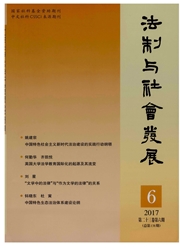

 中文摘要:
中文摘要:
台湾逻辑学经历了百年发展历程,共四个阶段,第一阶段:日据时期(1945年以前),台湾逻辑学萌芽期;第二个阶段:光复时期(1945年-1964年),台湾逻辑学的初建期:第三个阶段:宪政时期的戒严期(1964年-1987年),台湾逻辑学发展期;第四个阶段:宪政时期的民主化期(1987年至今),台湾逻辑学高涨期,各个阶段具有不同的特点。台湾逻辑学的数理逻辑与哲学逻辑建树颇丰,其中数理逻辑主要包含:集合论、证明论、模型论、递归函数等;哲学逻辑包含模态逻辑、知态逻辑、规范逻辑、语言逻辑等。而中国古代逻辑与因明学研究虽有成果,但其一直处于缓慢低谷期。本文通过全方位梳理台湾逻辑学不同时期的不同特征与成果,总结其发展规律与趋势,对大陆逻辑学的发展有重要的借鉴意义。
 英文摘要:
英文摘要:
The development of logic in Taiwan in the past 100 years can be divided into four stages, each of which has its own characteristics. The infant stage was the period before 1945 during the Japanese occupation. The early childhood stage started with the recovery of Taiwan by R.O.C. in 1945 and ended in the year of 1964, the year before the "economic take-off' of Taiwan. With the rapid economic growth and the enforcement of martial law in the period between 1964 and 1987, logic in Taiwan had a very good opportunity to develop as well. Finally, with the democratization of Taiwan from 1987 until now, logic in Taiwan has gained a boom. The focus of the teaching and re- searches of logic in Taiwan has mainly been on mathematical logic and philosophical logics; the former includes set theory, proof theory, model theory and recursion theory, while the latter include various types of philosophically motivated logic systems such as modal logics, epistemic logics, and formal semantics for natural languages. Even though ancient Chinese logic and Buddhist logic have always been present, their development in Taiwan has been comparatively slow and sometimes almost completely overlooked. In this paper, the author analyzes and characterizes the development of logic in Taiwan stage by stage. It is hoped that the results of this analysis will have some reference value to, and can be beneficial for, the future development of logic in mainland China.
 同期刊论文项目
同期刊论文项目
 同项目期刊论文
同项目期刊论文
 期刊信息
期刊信息
